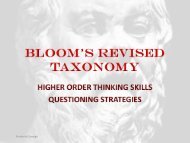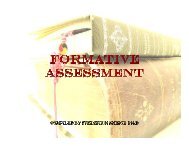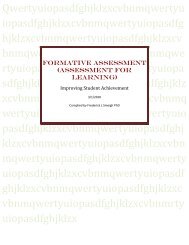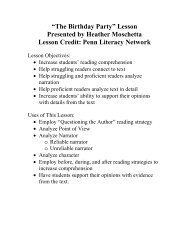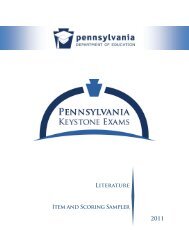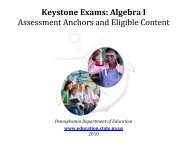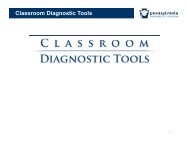PSSA Accommodations Guidelines for Students with IEPs and
PSSA Accommodations Guidelines for Students with IEPs and
PSSA Accommodations Guidelines for Students with IEPs and
Create successful ePaper yourself
Turn your PDF publications into a flip-book with our unique Google optimized e-Paper software.
Pennsylvania Department of Education<br />
<strong>Accommodations</strong> <strong>Guidelines</strong> <strong>for</strong> <strong>Students</strong> <strong>with</strong> <strong>IEPs</strong> <strong>and</strong> <strong>Students</strong> <strong>with</strong> 504 Plans<br />
TABLE 4: Timing <strong>and</strong> Scheduling <strong>Accommodations</strong><br />
WHAT ARE TIMING AND SCHEDULING ACCOMMODATIONS?<br />
Timing <strong>and</strong> scheduling accommodations change the allowable length of time to complete<br />
assignments, assessments, <strong>and</strong> activities, <strong>and</strong> may also change the way the time is organized.<br />
Timing accommodations give students the time <strong>and</strong> the breaks they need to complete<br />
activities, assignments, <strong>and</strong> assessments. Other changes may include the particular time of<br />
day, day of the week, or number of days over which a particular activity, assignment, or<br />
assessment takes place.<br />
WHO CAN BENEFIT FROM TIMING AND SCHEDULING ACCOMMODATIONS?<br />
Timing <strong>and</strong> scheduling accommodations are most helpful <strong>for</strong> students who need more time<br />
than generally allowed to complete activities, assignments, <strong>and</strong> assessments. Extra time may<br />
be needed to process written text (e.g., a student <strong>with</strong> a learning disability who processes<br />
in<strong>for</strong>mation slowly), to write (e.g., a student <strong>with</strong> limited dexterity), or to use other<br />
accommodations or equipment (e.g., assistive technology, audiotape, scribe).<br />
<strong>Students</strong> who cannot concentrate continuously <strong>for</strong> an extended period or who become<br />
frustrated, or stressed easily may need frequent or extended relaxation breaks. It may also<br />
help to schedule in the morning those classes <strong>and</strong> tests that require the greatest concentration<br />
<strong>for</strong> students who have difficulty concentrating <strong>and</strong> staying on task as the day progresses.<br />
Scheduling changes might also be helpful <strong>for</strong> students on medications that affect their ability<br />
to stay alert or who have more productive times of the day.<br />
Some students <strong>with</strong> health-related disabilities may have functioning levels that vary during<br />
the day because of the effects of medications or diminishing energy levels. For example,<br />
blood sugar levels may need to be maintained by eating several times a day at prescribed<br />
times. These students could be accommodated by scheduling tests <strong>and</strong> activities around the<br />
eating schedule, or by allowing food to be taken to the classroom or testing site. <strong>Students</strong><br />
who fatigue easily may need to take some academic classes <strong>and</strong> tests be<strong>for</strong>e rather than after<br />
a physical education class or recess, or may need to reduce physical activity.<br />
The Keystone Exams will not be administered 2011-2012 46 1/24/2012




